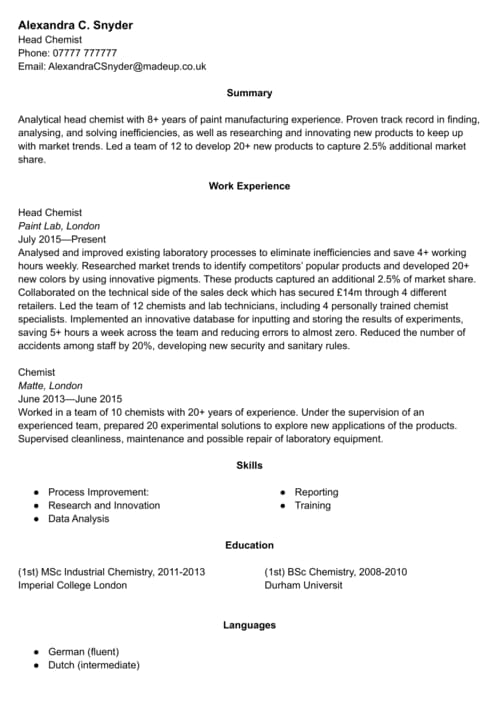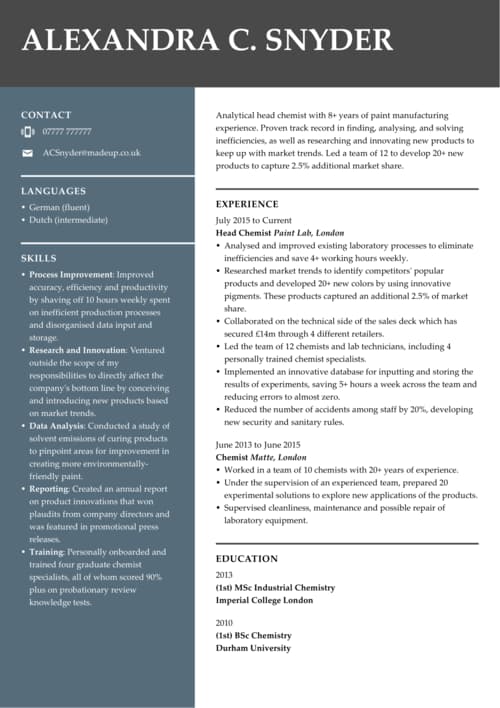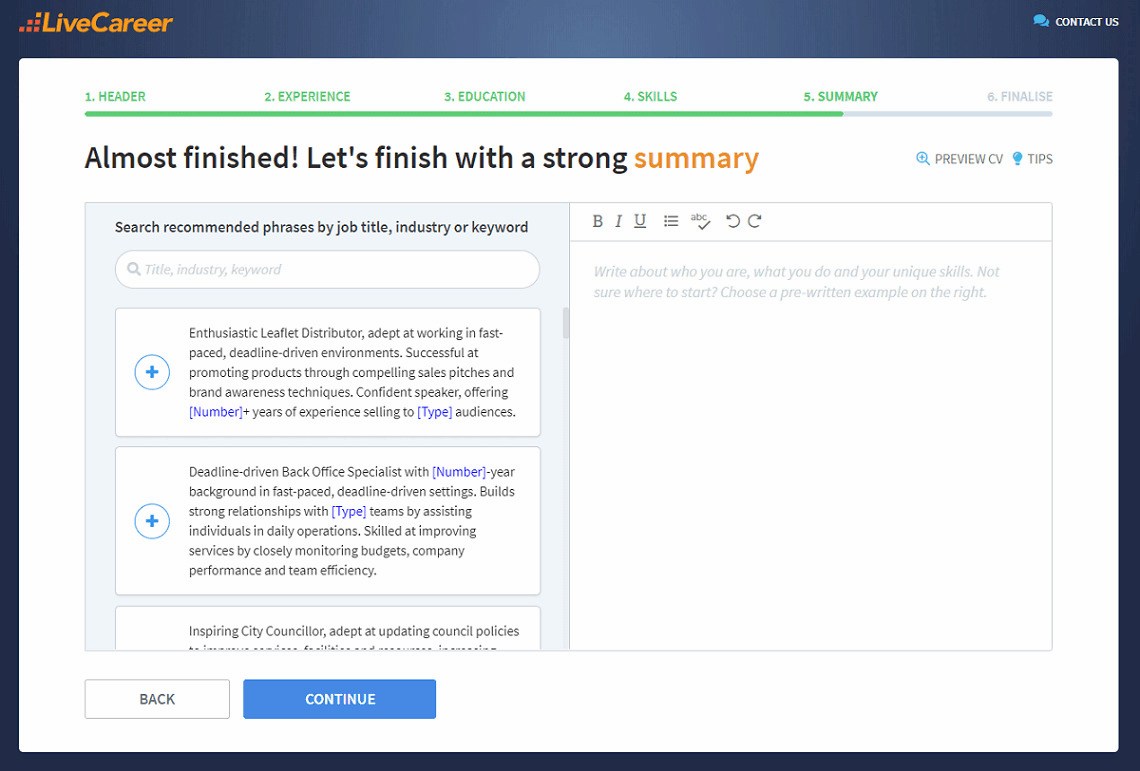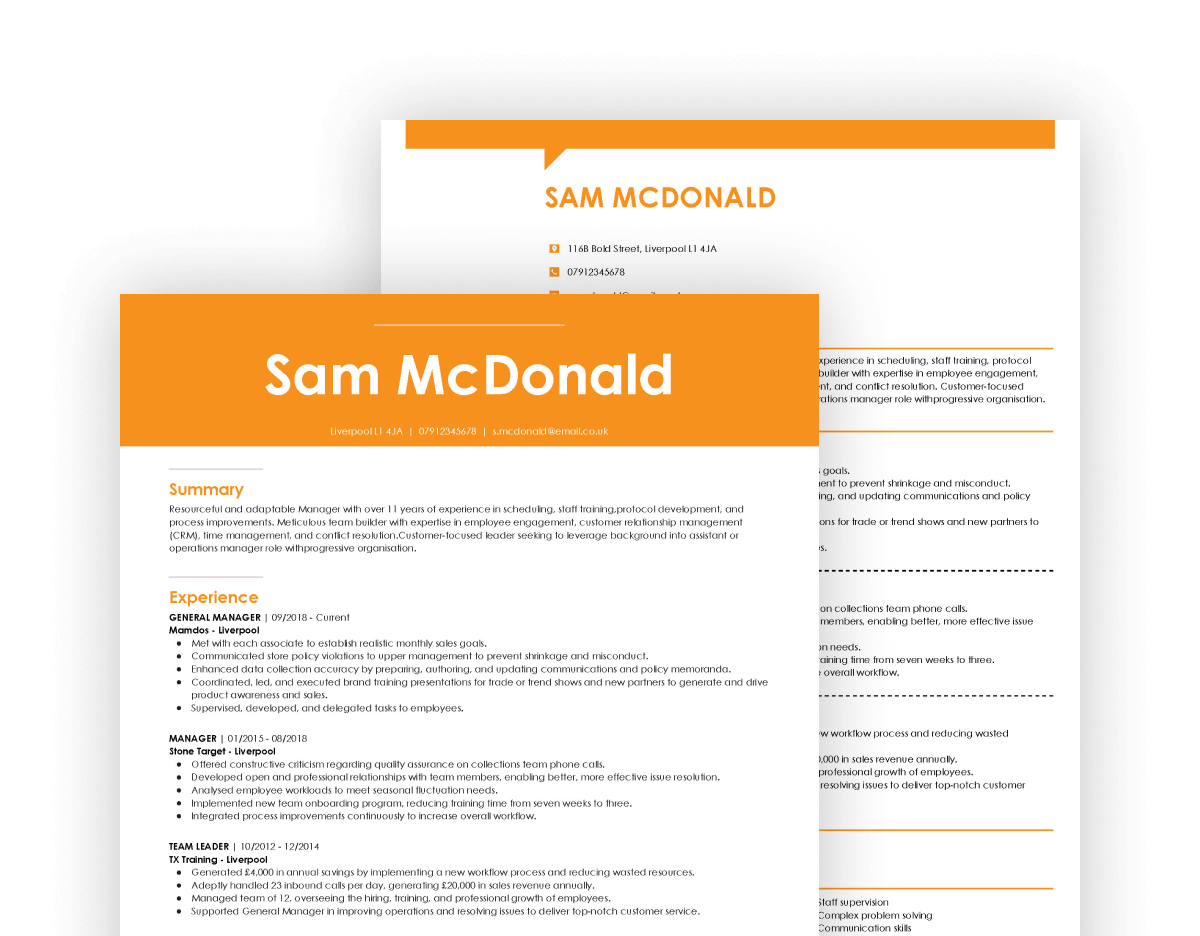Create a professional CV now!
 NO
NO YES
YESOur customers were hired by:
Analytical skills are the abilities that allow you to examine complex problems and develop solutions to them by collecting and analysing relevant information and data. Being able to do this allows you to find the most efficient ways to overcome challenges and identify opportunities for improvement.
So, how to demonstrate analytical skills on your CV? This guide will give you a head start.
Create an effective CV in minutes. Choose a professional CV template and fill in every section of your CV in a flash using ready-made content and expert tips.
Create a professional CV now!
 NO
NO YES
YESWe created the sample on the right using our builder. See other good CV examples like this one.
Listing skills for a CV? You must check similar skills and traits:
Alexandra C. Snyder
Head Chemist
Personal Info
Phone: 07777 777777
Email: AlexandraCSnyder@madeup.co.uk
Summary
Analytical head chemist with 8+ years of paint manufacturing experience. Proven track record in finding, analysing, and solving inefficiencies, as well as researching and innovating new products to keep up with market trends. Led a team of 12 to develop 20+ new products to capture 2.5% additional market share.
Work Experience
Head Chemist
Paint Lab, London
July 2015—Present
Chemist
Matte, London
June 2013—June 2015
Skills
Education
(1st) MSc Industrial Chemistry, 2011-2013
Imperial College London
(1st) BSc Chemistry, 2008-2010
Durham University
Languages
Studies show that not only is there strong growth in the need for analytical and interpersonal skills and a decline in the need for physical skills, but also that analytical skills provide the highest return over time.
What’s more, we live in the age of data and information. Strong analytical skills will help you pick it all apart so that you can gain understanding, novel insights, and draw conclusions. These are crucial to any company to operate smoothly, solve problems and increase its bottom line.
Here’s a list of some of the most important examples.
The planning of your research is crucial, unless you want to be clicking aimlessly for days. Starting with the right set of questions and hypotheses will point straight towards the variables you do, or don’t want to see. Managing your time and not steering into dead ends is part of a solid research method and a powerful transferable skill for any industry.
Being able to find and investigate data, spot trends and patterns, detect inconsistencies and draw conclusions from it is priceless to any business endeavour. Whether you’re processing spreadsheets or unstructured text, the value you extract can inform strategic decision making and be the difference between success and failure. Solid IT skills are essential for data analysis, so make sure yours are up to speed.
Unorganised, unstructured analysis is just pondering. Organising how much time you will spend on each task and prioritisation is crucial in not getting buried in data for days. Some creative conclusions can take time to click, but the grunt tasks should be organised and controlled.
Critical thinking is not quite questioning everything like many would say it is. It is an active process that can be taught: The act of breaking down each problem, argument and assumption into its components, examining the validity and importance of each part to the whole. Perhaps a big problem is caused by a small bottleneck, or outdated assumption.
Big part of it is not having set-in-stone ideas, assumptions or biases is crucial to reaching a valid and beneficial outcome, whatever it may be. It is a cautious process of finding the most valid path to your answer.
Your research and critical thinking skills equip you to go a step further—and solve actual problems effectively. The ability to identify the underlying causes of a problem and find data to support it will allow you to hypothesise an effective, realistic, and affordable solution.
Your analytical skills should not only equip you to solve existing problems, but foresee upcoming ones. You will use historical trends and patterns to make valid inferences about what the future might hold. Forecasting gives you the readiness to face challenges and adapt. This can make or break a company.
Problems, assumptions and biases are boxes. There are many people that can find those boxes. What sets the best analysts apart is the ability to think outside of them. There may be multiple solutions to a problem, and the first or the most obvious one may not be the best.
Being a Rain Man is not enough. It is more than likely that you will have to at least consult your data, conclusions and solutions with your colleagues or superiors. Communication skills are essential both in writing, and speaking publicly.
Structuring and presenting the path you took from problem to solution, or from data to prediction allows others to understand your thought process, present a possible challenge, as well as agree with you and support you—preferably all three in that order.
A strong CV summary will convince the recruiter you’re the perfect candidate. Save time and choose a ready-made personal statement written by career experts and adjust it to your needs in the LiveCareer CV builder.

Now you know the meaning of analytical skills and have seen some strong examples that will set you apart. How to start a CV that will display them? Like this.
Every CV starts with a CV summary, which is also sometimes called a CV profile. With some recruiters, this is all they’re going to read, so you shouldn’t wait to start showing your analytical side:
Personal Statement
Analytical head chemist with 8+ years of paint manufacturing experience. Proven track record in finding, analysing, and solving inefficiencies, as well as researching and innovating new products to keep up with market trends. Led a team of 12 to develop 20+ new products to capture 2.5% additional market share.
The work experience section is the crux of any CV. Showing strong analytical skills in relation to your responsibilities and achievements should be done here. We have plenty of CV tips to nail it.
Work Experience
Head Chemist
Paint Lab, London
July 2015—Present
You don’t have to be a CV writing expert. In the LiveCareer CV builder you’ll find ready-made content for every industry and position, which you can then add with a single click.

If you’re fresh out of school or university, showing analytical skills on a student CV can be tough. Describe extracurricular activities or modules that show you have a good analytical foundation.
And if you’re fresh out of school, you may not have much relevant experience to relate to. You can compensate for that by adding examples of analytical skills to your CV education section.
Education
(1st) BSc Chemistry, 2008-2010
Durham University
Relevant coursework—Advanced Quantitative Methods, Logic and Scientific Method, Introduction to Data Science
Most CV skills sections will be a list of a few random nouns. You can do better than that:
Skills
Most people think the CV hobbies and interests section is about them. It’s not, it’s still about the employer. If you’re going to list anything, make sure it is relevant to the image you’re trying to convey.
On the other hand, plugging in extra CV sections can help make the difference between being just average and having the perfect CV. List languages, certificates, and awards clearly under separate headings.
Languages
Certificates
At this point, you might be worried that you don’t have any strong analytical skills to add to your CV. But don’t be. Anyone can improve their analytical skills and start to use them to their advantage. Here are some ideas to get you started.
Don’t just say you have good analytical skills. In your CV and in job interviews, you need to be able to give examples. If you don’t understand the meaning of analytical skills, you won’t have a chance. But remember the definition and examples of analytical skills you’ve just read, and you’ll be set.
Training yourself to think more analytically is easier than you think. Playing games such as brain-teasers is a fun way to develop your skills. And this one is supported by science. There’s strong evidence that brain training games enhance cognitive function, which in turn will boost your ability to think analytically.
Exercise has been proven to improve your mental function and sharpen up your thinking. If you up your physical activity and improve your diet, then your brain will reap the rewards too. It’s well-established that keeping fit and healthy has a positive effect on your cognitive abilities.
Having a good head for numbers is essential for effective analytical thinking. And don’t sweat it if you were bad at maths at school. There are all kinds of fun ways to improve your numeracy that don’t involve being stuck in a classroom with a dusty textbook. Look for numeracy apps and check out maths YouTubers. Even the BBC has got in on the act with its excellent Skillswise platform for adult learning. Explore what’s out there and up your numbers game.
To improve and maintain your analytical skills, you’ll need to practise. And it’s easy to do. Whenever you come across a problem at work or at home, analyse the causes and think of what the best solution would be. And make sure you share your ideas. Apart from improving your analytical skills, it’s a great way of showing initiative at work.
There are more training options available than ever before. Start off with your employer and check if they offer internal training. But don’t stop there. Look online too. Training providers like Coursera, Udemy and others offer a good selection of analytical skills courses. So get Googling and get yourself trained.
It’s not all about using your brainpower. Learning to use analytical tools will be a massive boost to your abilities. Excel and Google Sheets make a good starting point, then you can start to explore more complex analytics software such as Power BI and Google Data Studio. And if you’re keen on learning a programming language, then R and Python are a great choice for data analysis.
It’s not all about your technical skills. As we’ve already mentioned, communication skills should be a part of your analytical tool box too. When you encounter problems at work, speak to all the parties involved. Actively elicit information from them and work to fully understand their perspective and opinion. It helps to ensure you’ve got all the data needed to make a good decision.
Developing strong analytical skills is a must for every job. Take the time to improve and practice them, and you’ll be more employable and more productive.
Remember to include examples of your analytical skills throughout your CV, not just in the skills section. And of course, write a cover letter. This gives you more space to elaborate on how you apply your skills, and sets you up with topics for an interesting interview with your future employer. Because with this guide, that’s what they’ll be. Your future employer.
If you need more help with how to demonstrate analytical skills in your CV, or you just want more specific analytical and problem solving skills examples, then let us know in the comments section. We’re more than happy to help.
Our editorial team has reviewed this article for compliance with Livecareer’s editorial guidelines. It’s to ensure that our expert advice and recommendations are consistent across all our career guides and align with current CV and cover letter writing standards and trends. We’re trusted by over 10 million job seekers, supporting them on their way to finding their dream job. Each article is preceded by research and scrutiny to ensure our content responds to current market trends and demand.
About the author
Since 2013, the LiveCareer UK team has shared the best advice to help you advance your career. Experts from our UK editorial team have written more than one hundred guides on how to write the perfect CV or cover letter.
Rate this article:
Analytical skills
Average:

LinkedIn can be a powerful networking & job-hunting tool (or a necessary evil), learn how to add your CV to LinkedIn & decide how you want to use it.
Gathering all the ingredients is one thing, but knowing how to outline a good CV is something else entirely. Check the proper CV outline in the UK.
You’ve put so much effort into writing your CV, it’d be a shame if no one read it. Here’s how you can write the best CV introduction to keep recruiters reading.
Our customers were hired by: